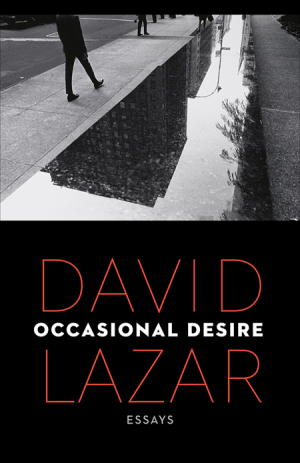Occasional Desire
“David Lazar is both a charmer and a challenger. His supple, cultivated mind is constantly moving, full of surprises; his puckish wit and exacting standards raise the bar for all contemporary literary nonfiction. This is an exciting collection, drawing strength from both the grand essay tradition and the cutting edge, and it is highly recommended.”—Phillip Lopate, editor of The Art of the Personal Essay
“David Lazar is a master of shimmering threshold moments, where acts of assertion and discovery face off (or is it hold hands?). Offering startling intimacies, gentle beckonings, and the severities of hard-won truths, Lazar is fearless about this core belief: investigations of form and self are one and the same adventure.”—Lia Purpura, author of Rough Likeness: Essays
“The spirits of past masters (Montaigne and Charles Lamb among them) animate and infuse the enthralling essays of David Lazar, a succinct virtuoso, whose gift is rueful, charm-filled introspection. His recollections and avowals unfurl with stellar melodiousness, and with a skilled comic’s perfect timing.”—Wayne Koestenbaum, author of Humiliation
In his new collection of essays, Occasional Desire, David Lazar meditates on random violence and vanished phone booths, on the excessive relationship to jewelry that links Kobe Bryant and Elizabeth Taylor, on Hitchcock, Francis Bacon, and M. F. K. Fisher. He explores, in his concentrically self-aware, amused, and ironic voice, what it means to be occasionally aware that we are surviving by our wits, and that our desires, ulterior or obvious, are what keep us alive. Lazar also turns his attention on the essay itself, affording us a three-dimensional look at the craft and the art of reading and writing a literary form that maps the world as it charts the peregrinations of the mind.
Lazar is especially interested in the trappings of memory, the trapdoors of memory, the way we gild or codify, select, soften, and self-delude ourselves based on our understanding of the past. His own process of selection and reflection reminds us of how far this literary form can take us, bound only by the limits of desire and imagination.
From Kirkus Reviews:
Essayist Lazar (Creative Writing and English/Columbia Coll. Chicago; The Body of Brooklyn, 2003, etc.) returns with a collection of ruminations ranging from the quotidian to the querulous, from the evanescent to the enduring.
The essays are full of odd information—e.g., James Agee and Robert Lowell died in taxis; M.F.K. Fisher had “immense eyes.” Lazar also leaps easily from popular to high culture. Yoda appears here, as do Elizabeth Taylor and Lou Costello, sometimes in the same essay with Philip Larkin, Flannery O’Connor or Francis Bacon. His diction varies widely, as well (often in the same piece).
In one essay, Lazar starts a sentence with, “There is an Epictetian balance…”; he ends another—a moving and troubling piece about death—with this: “Death is a motherfucker.”” Another characteristic of his style: quotations. One essay (on the self-portraits of Bacon) ends with about four pages of them, Bacon’s words at first alternating with those of Beckett, Pascal, Nietzsche, then taking over with five consecutive aphorisms. Lazar’s essays are traditional only in the sense that they use words and that they generally focus on a principal theme—though he is quick to digress when the mood strikes, which is often, and delightfully does so. He can be funny and self-deprecating (his essay about online dating), can craft wonderful sentences of about any length (there is a weirdly endless one in the dating essay), and can drop into his paragraphs epigrams worthy of Emerson. Oddly, when writing about the essay itself, he can be a bit dogmatic, insisting that his definition of the genre is the only worthy one.
Jagged pieces of a mirror that reveal a quirky, informed and immensely curious character.
